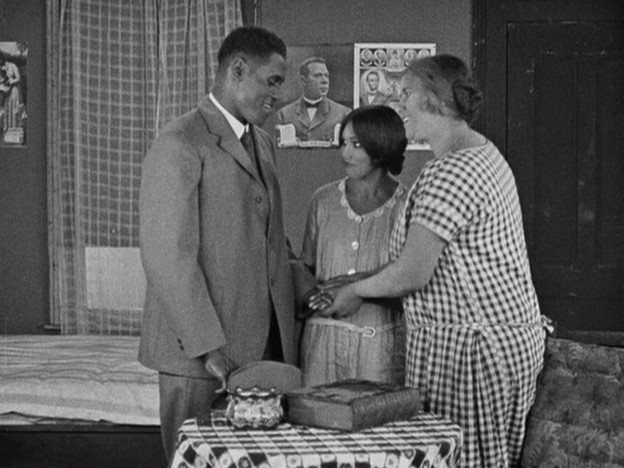Body and Soul (1925)
Oscar Micheaux's "Body and Soul"
With the breakthrough success of his 1920 film "Within Our Gates," Oscar Micheaux demonstrated his abilities to write and direct his own feature length film. One of the elements of the film was his condemnation of religious ideaology. His critisism seemed to stem from how religious doctrine could manipulate and dissuade them from scientific reason. His 1925 film, "Body and Soul," seemed to be a continuation of this theme.
Starring Paul Robeson, the film centers on an escape prisoner named Jenkins who seeks refugee in Georgia by passing himself off as a reverend. Jenkins, along with his fellow cellmate, Hinds, steal money from his church's congregation. After spending time with a mother and daughter named Martha Jane and Isabelle, respectively, Isabelle leaves her mother. Martha Jane comes home to find her daughter gone, along with all the money they've been saving. After searching for her, she finds her in Atlanta. Isabelle tells her mother that the reason she didn't say anything was because her mother would not believe her story, as it involves a scathing representation of 'Reverend' Jenkins, whom her mother puts on a pedestal. Isabelle tells her mother that the Reverend raped her and forced him to give him all of their money. After Isabelle dies of malnutrition, Martha Jane goes back to her chruch and calls out the Reverend for his corruption.
The film's primary thematic premise is the distrust of religion and religious leaders. Micheaux shows how Martha Jane's total trust in her ideology and the people that supposedly represented it lead to the demise of her family.
Another noteworthy element of the film is how Micheaux reveals this information towards the end of the film. He shows us how corrupt Jenkins is from the very beginning, however we are never sure what happened between him and Isabelle. After Martha Jane finds Isabelle in Atlanta do we then hear her story about the Reverend and what transpired between them. When Isabelle tells the story to her mother, Micheaux takes us on a visual flashback to show us these events. We discover the events at the same time as Martha Jane does. This allows us to share in the same shock as her.
"Body and Soul" throughout the century was ever really seen by black audiences. It wasn't until it showed at the New York Film Festival in 2000 that it began to receive retrospective accliam from white audiences. It is considered one of the great silent films that feature a full black cast.




Comments
Post a Comment